McAfee TIE¶
Table of Contents¶
Release Notes¶
Version |
Date |
Notes |
|---|---|---|
1.1.1 |
04/2025 |
Converted example workflows to python3 |
1.1.0 |
01/2021 |
Added Feature: Get, Set Reputation |
1.0.2 |
09/2020 |
Bug fixes |
1.0.1 |
05/2020 |
App Host support |
1.0.0 |
05/2018 |
Initial Release |
Overview¶
SOAR Components for McAfee TIE Functions
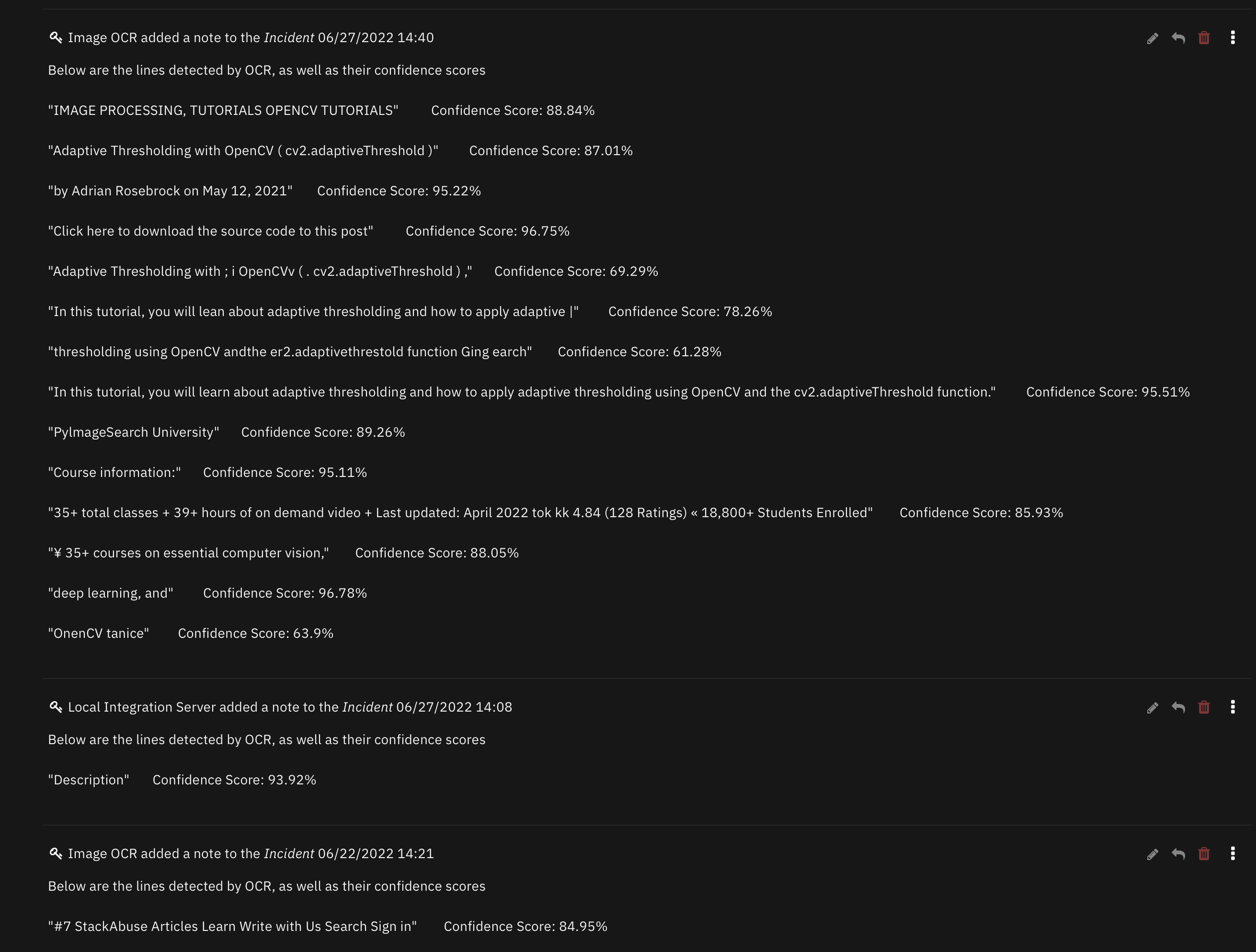
The McAfee TIE Functions for IBM SOAR provides the ability to search and set file reputation within McAfee Threat Intelligence Exchange (TIE) server for information on a specific file hash. This information can come from any of the providers:
Enterprise
GTI
ATD
MWG
In addition, a system list is returned by the function.
Key Features¶
Search for hashes in McAfee TIE
Set file reputation trust levels on file hashes
Requirements¶
This app supports the IBM SOAR Platform and the IBM Cloud Pak for Security.
SOAR platform¶
The SOAR platform supports two app deployment mechanisms, App Host and integration server.
If deploying to a SOAR platform with an App Host, the requirements are:
SOAR platform >=
51.0.0.The app is in a container-based format (available from the AppExchange as a
zipfile).
If deploying to a SOAR platform with an integration server, the requirements are:
SOAR platform >=
51.0.0.The app is in the older integration format (available from the AppExchange as a
zipfile which contains atar.gzfile).Integration server is running
resilient_circuits>=51.0.0.If using an API key account, make sure the account provides the following minimum permissions:
Name
Permissions
Org Data
Read
Function
Read
The following SOAR platform guides provide additional information:
App Host Deployment Guide: provides installation, configuration, and troubleshooting information, including proxy server settings.
Integration Server Guide: provides installation, configuration, and troubleshooting information, including proxy server settings.
System Administrator Guide: provides the procedure to install, configure and deploy apps.
The above guides are available on the IBM Knowledge Center at ibm.biz/resilient-docs. On this web page, select your SOAR platform version. On the follow-on page, you can find the App Host Deployment Guide or Integration Server Guide by expanding SOAR Apps in the Table of Contents pane. The System Administrator Guide is available by expanding System Administrator.
Cloud Pak for Security¶
If you are deploying to IBM Cloud Pak for Security, the requirements are:
IBM Cloud Pak for Security >= 1.4.
Cloud Pak is configured with an App Host.
The app is in a container-based format (available from the AppExchange as a
zipfile).
The following Cloud Pak guides provide additional information:
App Host Deployment Guide: provides installation, configuration, and troubleshooting information, including proxy server settings. From the Table of Contents, select Case Management and Orchestration & Automation > Orchestration and Automation Apps.
System Administrator Guide: provides information to install, configure, and deploy apps. From the IBM Cloud Pak for Security Knowledge Center table of contents, select Case Management and Orchestration & Automation > System administrator.
These guides are available on the IBM Knowledge Center at ibm.biz/cp4s-docs. From this web page, select your IBM Cloud Pak for Security version. From the version-specific Knowledge Center page, select Case Management and Orchestration & Automation.
Proxy Server¶
The app supports a proxy server. See the DXL Configuration file for settings.
Python Environment¶
Python 3.9 and 3.11 are supported. Additional package dependencies may exist for each of these packages:
PySocks
resilient_circuits>=51.0.0
dxlclient
dxltieclient
Installation¶
Install¶
To install or uninstall an App or Integration on the SOAR platform, see the documentation at ibm.biz/resilient-docs.
To install or uninstall an App on IBM Cloud Pak for Security, see the documentation at ibm.biz/cp4s-docs and follow the instructions above to navigate to Orchestration and Automation.
App Configuration¶
The following table provides the settings you need to configure the app. These settings are made in the app.config file. See the documentation discussed in the Requirements section for the procedure.
Config |
Required |
Example |
Description |
|---|---|---|---|
dxlclient_config |
Yes |
|
DXLClient configuration file. See the OpenDXL documentation for instructions on how to set. |
App Host Configuration¶
Since McAfee TIE references it’s own configuration file, this file needs to be added to the files available to the container running this app for App Host. This is done by referring to the location of config file as /var/rescircuits/fn_mcafee_tie/dxlclient.config within the container and then including that file in the files available to the app. See the snapshot below for an example.
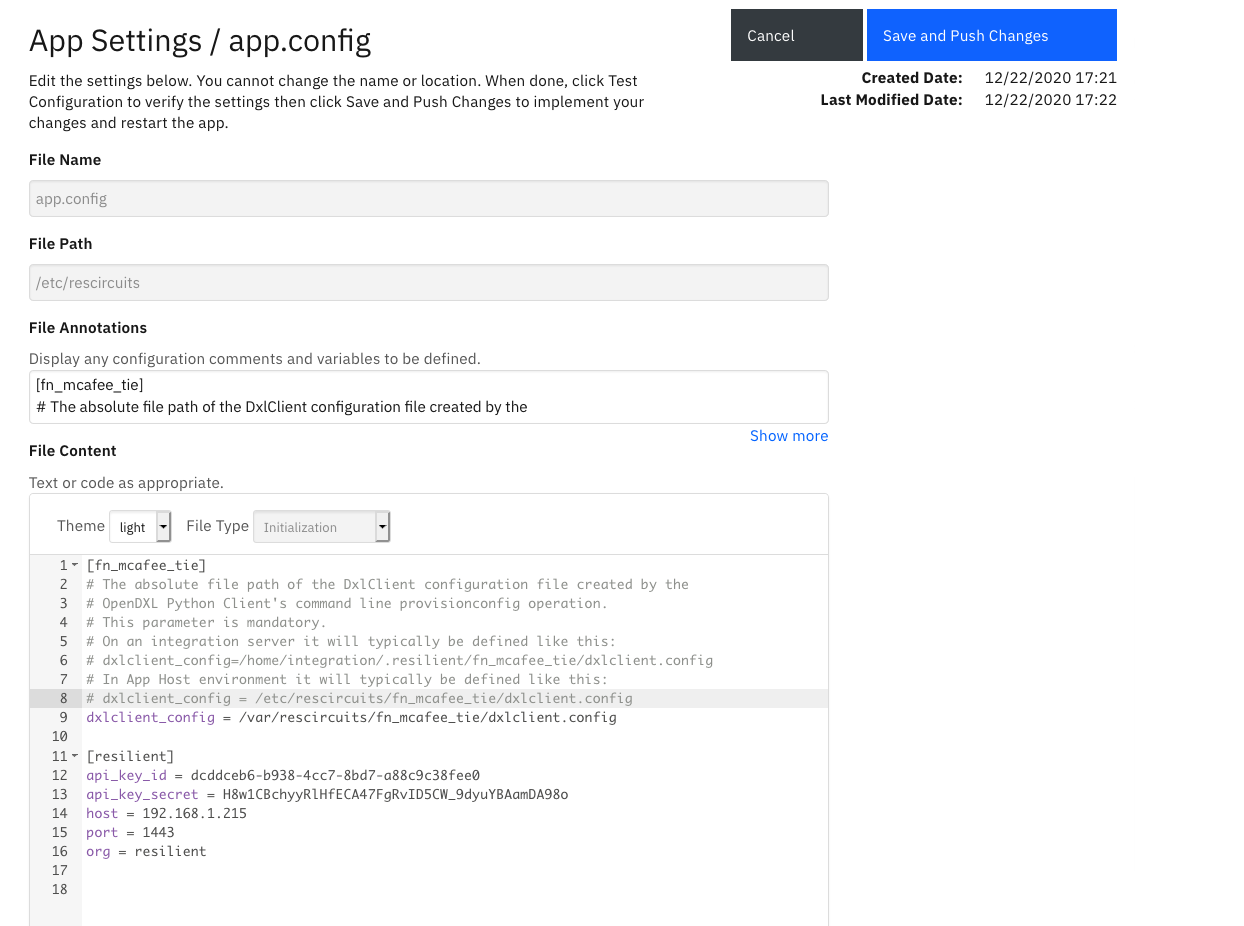
In addition to the dxlclient.config file, three certificate files need to be added to the app: ca-bundle.crt, client.crt, client.key. These files were built when you generated the dxlclient.config file and will be included in the same folder location. Be aware that all references to the folder (ex. /var/rescircuits/fn_mcafee_tie/) must be specified the same way. That is, all references to the file path should contain the trailing slash or all references should leave it off.
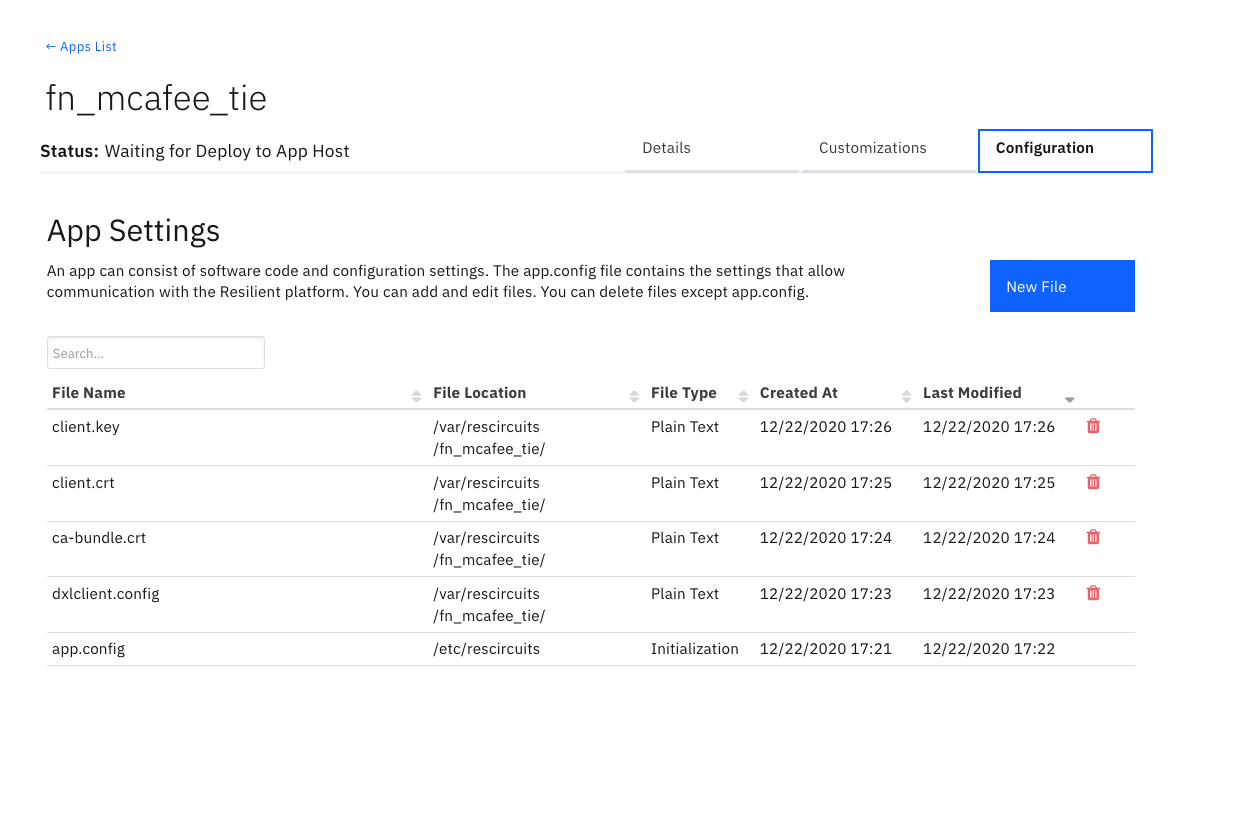
Custom Layouts¶
Import the Data Table, TIE Results, like the screenshot below. Your setup may use a different tab:
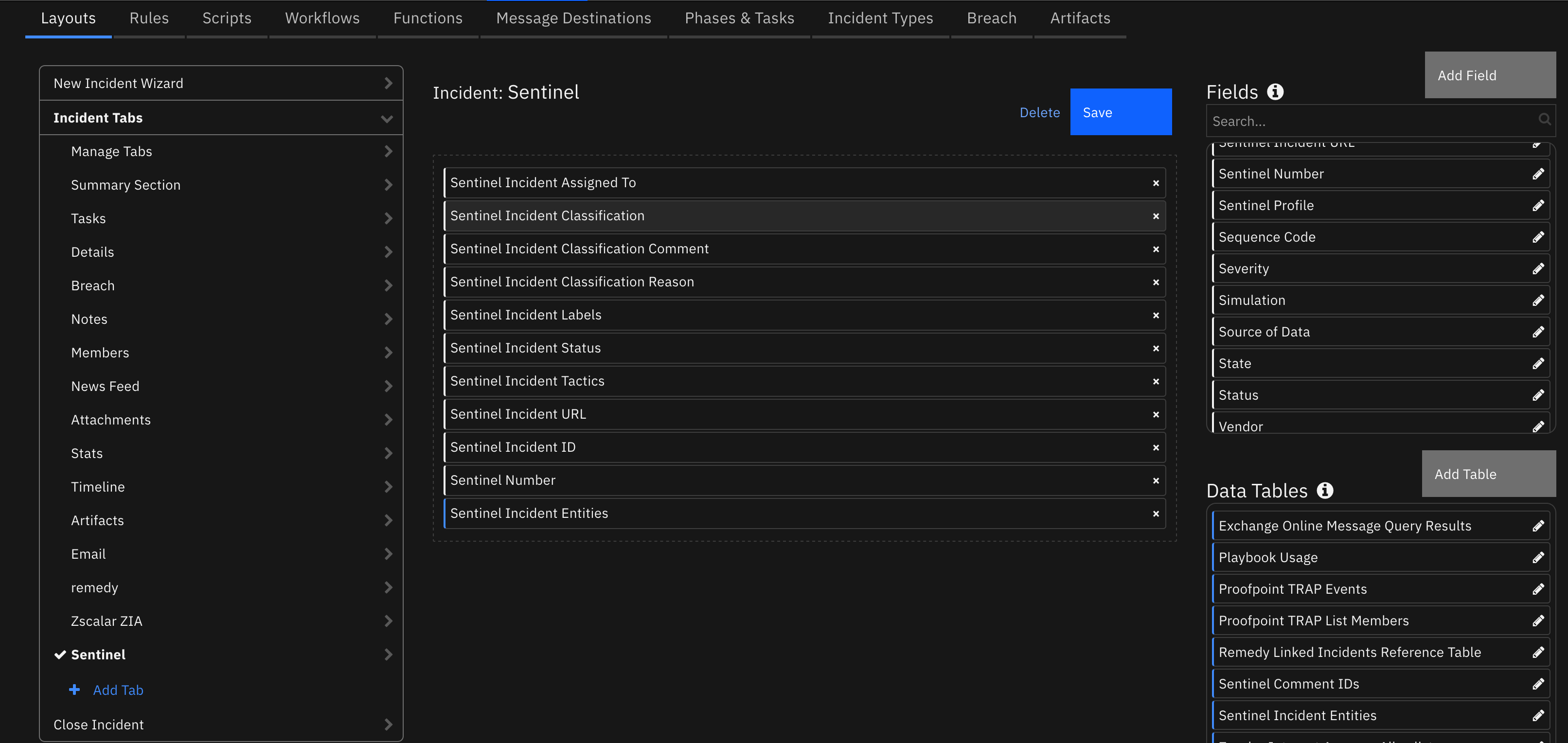
Custom Artifact Type¶
A new artifact type is provided, Certificate SHA-1 Hash. This can be used to create new artifacts
which are different than Malware SHA-1 Hash artifacts. The latter are used for getting and
setting reputations.
Function - McAfee TIE: Set File Reputation¶
Set a file’s reputation. This works on MD5, SH1 and SHA256 hashes. Either ‘Enterprise’ or ‘External’ reputations can be set.
Manual action rules are available from an artifact or from the TIE Results datatable.
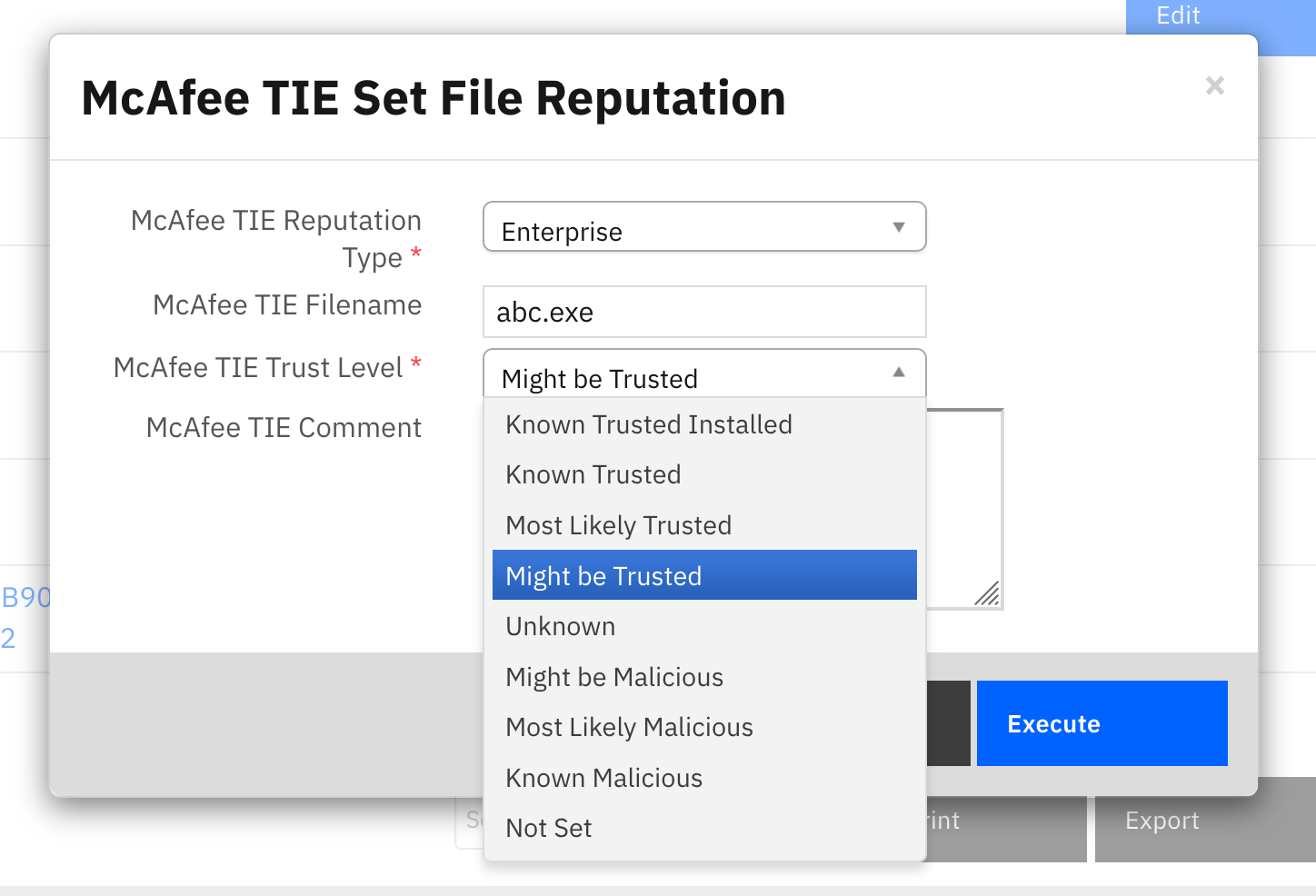
Inputs:
Name |
Type |
Required |
Example |
Tooltip |
|---|---|---|---|---|
|
|
Yes |
`External |
Enterprise` |
|
|
No |
|
- |
|
|
No |
|
Used for new reputation entries |
|
|
Yes |
|
The value of the hash |
|
|
Yes |
|
The type of file hash (md5, sha1, sha256) |
|
|
Yes |
|
- |
Outputs:
results = {
'version': '1.0',
'success': True,
'reason': None,
'content': {
'hashes': {
'sha1': 'd5dd920be5bcfeb904e95da4b6d0ccca0727d692'
},
'oldReputations': {
3: {
'createDate': 1608652058,
'providerId': 3,
'trustLevel': 50,
'attributes': {
'2101652': '1',
'2123156': '0',
'2098277': '0',
'2102165': '1608652058',
'2114965': '1',
'2111893': '4',
'2139285': '216172786408751223'
}
},
1: {
'createDate': 1608652105,
'providerId': 1,
'trustLevel': 1,
'attributes': {
'2120340': '2134902792'
}
}
},
'newReputations': {
3: {
'createDate': 1608652058,
'providerId': 3,
'trustLevel': 99,
'attributes': {
'2101652': '1',
'2123156': '0',
'2098277': '0',
'2102165': '1608652058',
'2114965': '1',
'2111893': '4',
'2139285': '216172786408751223'
}
},
1: {
'createDate': 1608652105,
'providerId': 1,
'trustLevel': 1,
'attributes': {
'2120340': '2134902792'
}
}
},
'updateTime': 1608669082
},
'raw': '{"hashes": {"sha1": "d5dd920be5bcfeb904e95da4b6d0ccca0727d692"}, "oldReputations": {"3": {"createDate": 1608652058, "providerId": 3, "trustLevel": 50, "attributes": {"2101652": "1", "2123156": "0", "2098277": "0", "2102165": "1608652058", "2114965": "1", "2111893": "4", "2139285": "216172786408751223"}}, "1": {"createDate": 1608652105, "providerId": 1, "trustLevel": 1, "attributes": {"2120340": "2134902792"}}}, "newReputations": {"3": {"createDate": 1608652058, "providerId": 3, "trustLevel": 99, "attributes": {"2101652": "1", "2123156": "0", "2098277": "0", "2102165": "1608652058", "2114965": "1", "2111893": "4", "2139285": "216172786408751223"}}, "1": {"createDate": 1608652105, "providerId": 1, "trustLevel": 1, "attributes": {"2120340": "2134902792"}}}, "updateTime": 1608669082}',
'inputs': {
'mcafee_tie_hash_type': 'Malware SHA-1 Hash',
'mcafee_tie_hash': 'D5DD920BE5BCFEB904E95DA4B6D0CCCA0727D692',
'mcafee_tie_trust_level': {
'id': 880,
'name': 'Known Trusted'
},
'mcafee_tie_comment': None
},
'metrics': {
'version': '1.0',
'package': 'fn-mcafee-tie',
'package_version': '1.1.0',
'host': 'Marks-MacBook-Pro.local',
'execution_time_ms': 5048,
'timestamp': '2020-12-22 15:31:27'
}
}
Example Pre-Process Script:
inputs.mcafee_tie_reputation_type = str(rule.properties.mcafee_tie_reputation_type)
inputs.mcafee_tie_trust_level = str(rule.properties.mcafee_tie_trust_level)
inputs.mcafee_tie_comment = rule.properties.mcafee_tie_comment.content
inputs.mcafee_tie_filename = rule.properties.mcafee_tie_filename
inputs.mcafee_tie_hash_type = artifact.type
inputs.mcafee_tie_hash = artifact.value
Example Post-Process Script:
note = u"McAfee TIE File Reputation: {}\nReputation Type: {}\nHash: {} ({})\nFile Name: {}\nComment: {}"\
.format(results.inputs['mcafee_tie_trust_level']['name'],
results.inputs['mcafee_tie_reputation_type']['name'],
results.inputs['mcafee_tie_hash'],
artifact.type,
results.inputs['mcafee_tie_filename'],
results.inputs['mcafee_tie_comment'])
if results.content:
incident.addNote("Set reputation successful\n{}".format(note))
else:
incident.addNote("Set reputation unsuccessful. An internal McAfee error has occurred.\n{}".format(note))
Support for External Reputations¶
It’s possible to configure your workflows to use External reputations as well as Enterprise reputations. One solution would be to add a selection field to your action rule with the values ‘External’ and ‘Enterprise’. Then, in your workflow, you can alter the pre-processing script to reference the reputation type from the rule properties:
inputs.mcafee_tie_reputation_type = str(rule.properties.mcafee_tie_reputation_type)
Creating a new activity field as type Select with Enterprise and External values.
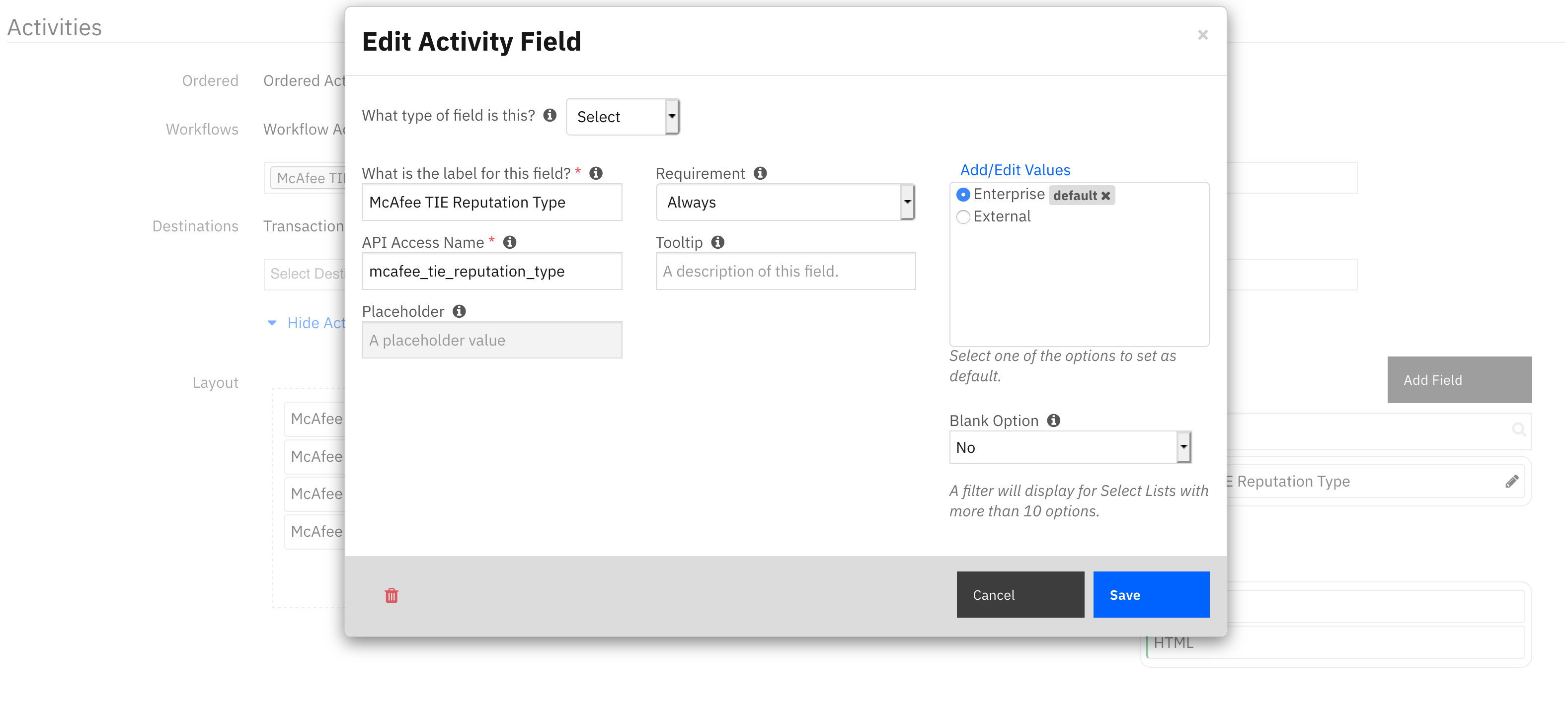
Adding the activity field to the rule.
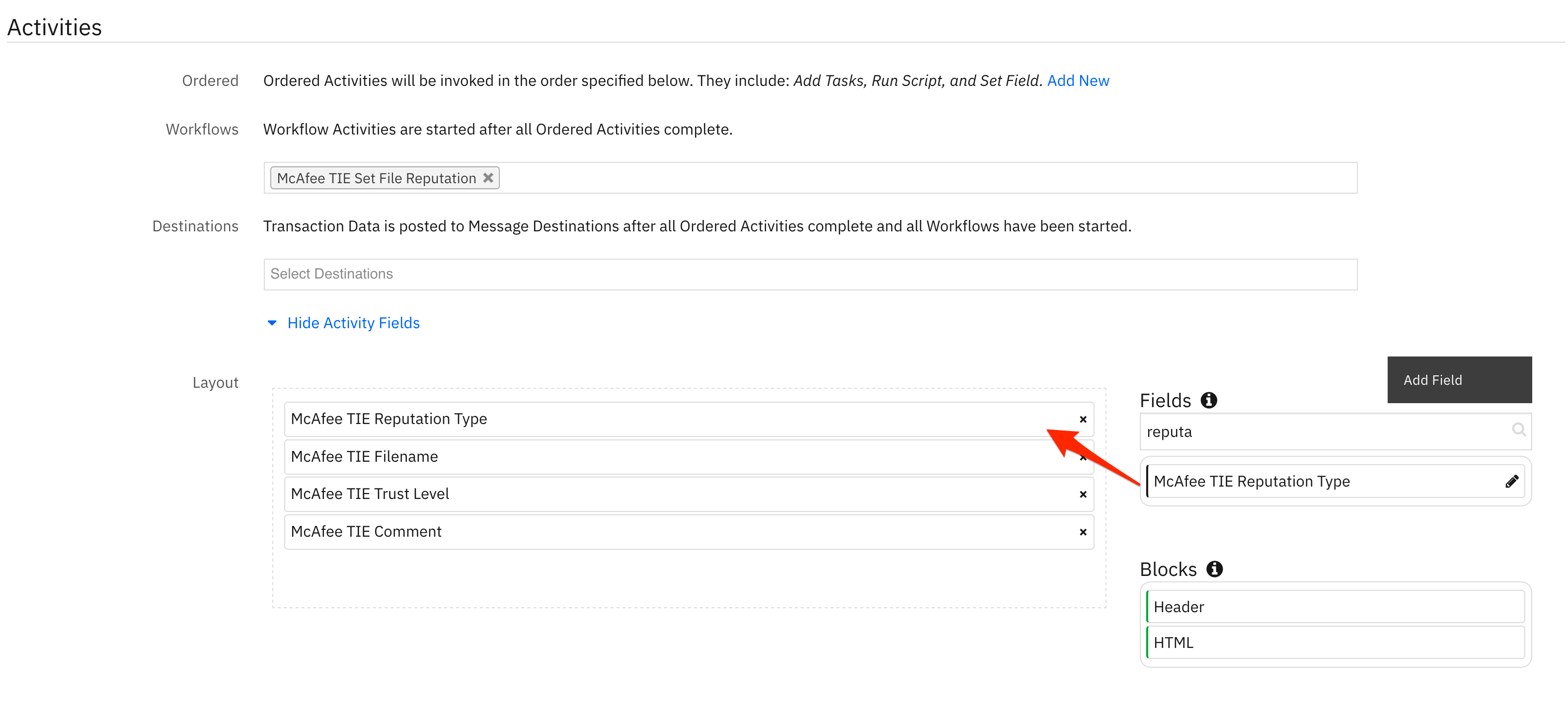
Function - McAfee TIE search hash¶
A function which takes two inputs:
mcafee_tie_hash_type: The type of file hash (md5, sha1, sha256). mcafee_tie_hash: The value of the hash.
The function returns back a dict of all the available information from the different file providers (Enterprise, GTI, ATD, MWG) along with the list of systems related to it.
Inputs:
Name |
Type |
Required |
Example |
Tooltip |
|---|---|---|---|---|
|
|
Yes |
|
The value of the hash |
|
|
Yes |
|
The type of file hash (md5, sha1, sha256) |
Outputs:
results = {
'version': '1.0',
'success': True,
'reason': None,
'content': {
'mcafee_topic_name': '/mcafee/event/epo/threat/response',
'mcafee_dxl_payload': '{"hashes": [{"type": "md5", "value": "Dk0TzJrwTMZLaPw4/goNrA=="}], "providerId": 3, "trustLevel": 1}',
'mcafee_publish_method': 'Service',
'mcafee_wait_for_response': 'No'
},
'raw': '{"mcafee_topic_name": "/mcafee/event/epo/threat/response", "mcafee_dxl_payload": "{\\"hashes\\": [{\\"type\\": \\"md5\\", \\"value\\": \\"Dk0TzJrwTMZLaPw4/goNrA==\\"}], \\"providerId\\": 3, \\"trustLevel\\": 1}", "mcafee_publish_method": "Service", "mcafee_wait_for_response": "No"}',
'inputs': {
'mcafee_publish_method': {
'id': 205,
'name': 'Service'
},
'mcafee_topic_name': '/mcafee/event/epo/threat/response',
'mcafee_dxl_payload': '{"hashes": [{"type": "md5", "value": "Dk0TzJrwTMZLaPw4/goNrA=="}], "providerId": 3, "trustLevel": 1}',
'mcafee_wait_for_response': {
'id': 203,
'name': 'No'
}
},
'metrics': {
'version': '1.0',
'package': 'fn-mcafee-opendxl',
'package_version': '1.2.0',
'host': 'Marks-MacBook-Pro.local',
'execution_time_ms': 0,
'timestamp': '2020-12-22 15:31:49'
},
'mcafee_topic_name': '/mcafee/event/epo/threat/response',
'mcafee_dxl_payload': '{"hashes": [{"type": "md5", "value": "Dk0TzJrwTMZLaPw4/goNrA=="}], "providerId": 3, "trustLevel": 1}',
'mcafee_publish_method': 'Service',
'mcafee_wait_for_response': 'No'
}
Example Pre-Process Script:
if artifact.type == "Malware MD5 Hash":
inputs.mcafee_tie_hash_type = "md5"
inputs.mcafee_tie_hash = artifact.value
elif artifact.type == "Malware SHA-1 Hash":
inputs.mcafee_tie_hash_type = "sha1"
inputs.mcafee_tie_hash = artifact.value
elif artifact.type == "Malware SHA-256 Hash":
inputs.mcafee_tie_hash_type = "sha256"
inputs.mcafee_tie_hash = artifact.value
else:
helper.fail("Artifact hash was not set correctly")
Example Post-Process Script:
"""
Data returned will be in the following structure
{
"GTI":{
"File Provider":"GTI",
"Attributes":{
},
"Create Date":"2018-02-21 12:17:10",
"Trust Level":"Known Malicious"
},
"ATD":{
"File Provider":"ATD",
"Create Date":"2018-03-14 11:53:09",
"Trust Level":"Most Likely Malicious"
},
"MWG":{
"File Provider":"MWG",
"Create Date":"2018-03-14 11:53:55",
"Trust Level":"Most Likely Malicious"
},
"Enterprise":{
"File Provider":"Enterprise",
"Attributes":{
"Average Local Rep":"Most Likely Malicious",
"First Contact":"2018-02-21 12:17:10",
"Min Local Rep":"Most Likely Malicious",
"Is Prevalent":"0",
"File Name Count":"1",
"Max Local Rep":"Most Likely Malicious"
},
"Create Date":"2018-02-21 12:17:10",
"Trust Level":"Most Likely Malicious"
}
"system_list":[{
"date": 1519233563,
"agentGuid": {a00728ff-3187-46c1-97d2-8e0f26ea940b}
}]
}
"""
import java.util.Date as Date
if results.get("Enterprise"):
row = incident.addRow("tie_results")
row['results_date'] = str(Date())
row["hash_type"] = artifact.type
row["hash"] = artifact.value
row["ent_trust_level"] = results["Enterprise"].get("Trust Level")
row["tie_create_date"] = results["Enterprise"].get("Create Date")
row["gti_trust_level"] = results["GTI"].get("Trust Level")
row["atd_trust_level"] = results["ATD"].get("Trust Level")
row["mwg_trust_level"] = results["MWG"].get("Trust Level")
Data Table - TIE Results¶
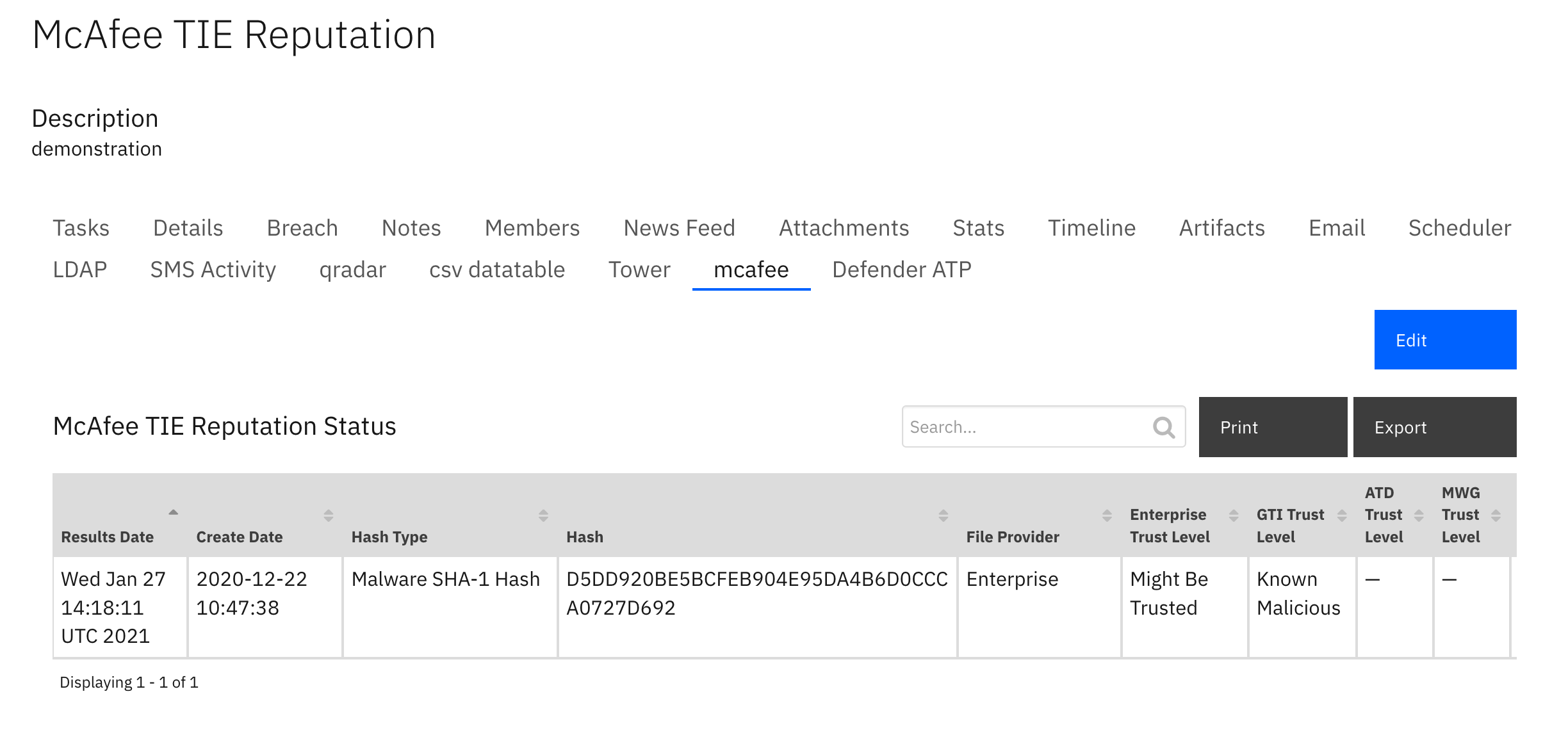
API Name:¶
tie_results
Columns:¶
Column Name |
API Access Name |
Type |
Tooltip |
|---|---|---|---|
Results Date |
|
|
- |
File Name |
|
|
- |
Hash |
|
|
- |
Hash Type |
|
|
- |
Create Date |
|
|
- |
Enterprise Trust Level |
|
|
- |
GTI Trust Level |
|
|
- |
ATD Trust Level |
|
|
- |
MWG Trust Level |
|
|
- |
Rules¶
Rule Name |
Object |
Workflow Triggered |
|---|---|---|
McAfee TIE Set File Reputation |
artifact |
|
McAfee TIE Set File Reputation - Datatable |
tie_results |
|
McAfee TIE Get File Reputation |
artifact |
|
McAfee TIE Get Current File Reputation |
Datatable |
|
Troubleshooting & Support¶
Refer to the documentation listed in the Requirements section for troubleshooting information.
For Support¶
This is an IBM supported app. Please search https://ibm.com/mysupport for assistance.